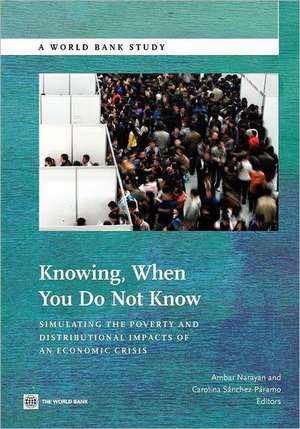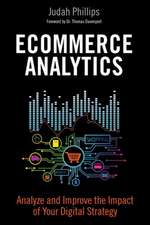Knowing When You Do Not Know: Simulating the Poverty and Distributional Impacts of an Economic Crisis: World Bank Studies
Editat de Ambar Narayan, Carolina Sanchezen Limba Engleză Paperback – 30 noi 2011
Din seria World Bank Studies
-
 Preț: 248.91 lei
Preț: 248.91 lei -
 Preț: 230.04 lei
Preț: 230.04 lei -
 Preț: 228.29 lei
Preț: 228.29 lei -
 Preț: 219.20 lei
Preț: 219.20 lei -
 Preț: 229.48 lei
Preț: 229.48 lei -
 Preț: 233.13 lei
Preț: 233.13 lei -
 Preț: 234.50 lei
Preț: 234.50 lei -
 Preț: 200.52 lei
Preț: 200.52 lei -
 Preț: 200.52 lei
Preț: 200.52 lei - 5%
 Preț: 242.04 lei
Preț: 242.04 lei -
 Preț: 190.63 lei
Preț: 190.63 lei -
 Preț: 233.51 lei
Preț: 233.51 lei -
 Preț: 192.36 lei
Preț: 192.36 lei -
 Preț: 229.66 lei
Preț: 229.66 lei -
 Preț: 205.91 lei
Preț: 205.91 lei -
 Preț: 230.04 lei
Preț: 230.04 lei -
 Preț: 230.80 lei
Preț: 230.80 lei -
 Preț: 227.37 lei
Preț: 227.37 lei -
 Preț: 201.11 lei
Preț: 201.11 lei -
 Preț: 230.24 lei
Preț: 230.24 lei -
 Preț: 233.13 lei
Preț: 233.13 lei - 5%
 Preț: 224.22 lei
Preț: 224.22 lei -
 Preț: 204.37 lei
Preț: 204.37 lei -
 Preț: 214.18 lei
Preț: 214.18 lei -
 Preț: 196.01 lei
Preț: 196.01 lei -
 Preț: 232.54 lei
Preț: 232.54 lei -
 Preț: 229.66 lei
Preț: 229.66 lei -
 Preț: 192.36 lei
Preț: 192.36 lei -
 Preț: 191.60 lei
Preț: 191.60 lei -
 Preț: 204.98 lei
Preț: 204.98 lei -
 Preț: 230.04 lei
Preț: 230.04 lei -
 Preț: 190.63 lei
Preț: 190.63 lei -
 Preț: 232.00 lei
Preț: 232.00 lei -
 Preț: 207.86 lei
Preț: 207.86 lei -
 Preț: 191.76 lei
Preț: 191.76 lei -
 Preț: 208.62 lei
Preț: 208.62 lei -
 Preț: 219.20 lei
Preț: 219.20 lei -
 Preț: 168.49 lei
Preț: 168.49 lei -
 Preț: 193.13 lei
Preț: 193.13 lei -
 Preț: 234.28 lei
Preț: 234.28 lei -
 Preț: 262.67 lei
Preț: 262.67 lei -
 Preț: 197.36 lei
Preț: 197.36 lei -
 Preț: 232.54 lei
Preț: 232.54 lei -
 Preț: 222.63 lei
Preț: 222.63 lei -
 Preț: 206.28 lei
Preț: 206.28 lei -
 Preț: 176.37 lei
Preț: 176.37 lei -
 Preț: 171.37 lei
Preț: 171.37 lei -
 Preț: 169.08 lei
Preț: 169.08 lei -
 Preț: 232.00 lei
Preț: 232.00 lei -
 Preț: 229.10 lei
Preț: 229.10 lei
Preț: 168.49 lei
Nou
Puncte Express: 253
Preț estimativ în valută:
32.24€ • 33.66$ • 26.68£
32.24€ • 33.66$ • 26.68£
Carte tipărită la comandă
Livrare economică 04-18 aprilie
Preluare comenzi: 021 569.72.76
Specificații
ISBN-13: 9780821389812
ISBN-10: 0821389815
Pagini: 72
Dimensiuni: 178 x 254 x 4 mm
Greutate: 0.15 kg
Ediția:New.
Editura: World Bank Publications
Seria World Bank Studies
ISBN-10: 0821389815
Pagini: 72
Dimensiuni: 178 x 254 x 4 mm
Greutate: 0.15 kg
Ediția:New.
Editura: World Bank Publications
Seria World Bank Studies














